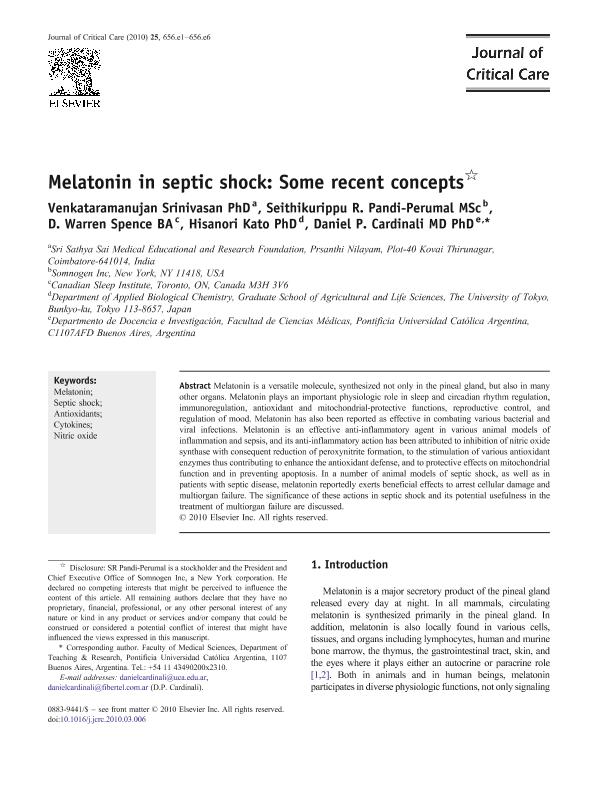Mostrar el registro sencillo del ítem
dc.contributor.author
Srinivasan, Venkataramanujan
dc.contributor.author
Pandi Perumal, Seithikurippu R.

dc.contributor.author
Spence, D. Warren
dc.contributor.author
Kato, Hisanori
dc.contributor.author
Cardinali, Daniel Pedro

dc.date.available
2023-03-22T14:38:30Z
dc.date.issued
2010-12
dc.identifier.citation
Srinivasan, Venkataramanujan; Pandi Perumal, Seithikurippu R.; Spence, D. Warren; Kato, Hisanori; Cardinali, Daniel Pedro; Melatonin in septic shock: Some recent concepts; W B Saunders Co-Elsevier Inc; Journal Of Critical Care; 25; 4; 12-2010; 656.e1-656.e6
dc.identifier.issn
0883-9441
dc.identifier.uri
http://hdl.handle.net/11336/191410
dc.description.abstract
Melatonin is a versatile molecule, synthesized not only in the pineal gland, but also in many other organs. Melatonin plays an important physiologic role in sleep and circadian rhythm regulation, immunoregulation, antioxidant and mitochondrial-protective functions, reproductive control, and regulation of mood. Melatonin has also been reported as effective in combating various bacterial and viral infections. Melatonin is an effective anti-inflammatory agent in various animal models of inflammation and sepsis, and its anti-inflammatory action has been attributed to inhibition of nitric oxide synthase with consequent reduction of peroxynitrite formation, to the stimulation of various antioxidant enzymes thus contributing to enhance the antioxidant defense, and to protective effects on mitochondrial function and in preventing apoptosis. In a number of animal models of septic shock, as well as in patients with septic disease, melatonin reportedly exerts beneficial effects to arrest cellular damage and multiorgan failure. The significance of these actions in septic shock and its potential usefulness in the treatment of multiorgan failure are discussed.
dc.format
application/pdf
dc.language.iso
eng
dc.publisher
W B Saunders Co-Elsevier Inc

dc.rights
info:eu-repo/semantics/openAccess
dc.rights.uri
https://creativecommons.org/licenses/by-nc-sa/2.5/ar/
dc.subject
ANTIOXIDANTS
dc.subject
CYTOKINES
dc.subject
MELATONIN
dc.subject
NITRIC OXIDE
dc.subject
SEPTIC SHOCK
dc.subject.classification
Fisiología

dc.subject.classification
Medicina Básica

dc.subject.classification
CIENCIAS MÉDICAS Y DE LA SALUD

dc.title
Melatonin in septic shock: Some recent concepts
dc.type
info:eu-repo/semantics/article
dc.type
info:ar-repo/semantics/artículo
dc.type
info:eu-repo/semantics/publishedVersion
dc.date.updated
2023-03-21T18:21:31Z
dc.journal.volume
25
dc.journal.number
4
dc.journal.pagination
656.e1-656.e6
dc.journal.pais
Estados Unidos

dc.description.fil
Fil: Srinivasan, Venkataramanujan. No especifíca;
dc.description.fil
Fil: Pandi Perumal, Seithikurippu R.. No especifíca;
dc.description.fil
Fil: Spence, D. Warren. No especifíca;
dc.description.fil
Fil: Kato, Hisanori. No especifíca;
dc.description.fil
Fil: Cardinali, Daniel Pedro. Pontificia Universidad Católica Argentina "Santa María de los Buenos Aires"; Argentina. Consejo Nacional de Investigaciones Científicas y Técnicas; Argentina
dc.journal.title
Journal Of Critical Care

dc.relation.alternativeid
info:eu-repo/semantics/altIdentifier/url/https://www.sciencedirect.com/science/article/pii/S0883944110000778?via%3Dihub
dc.relation.alternativeid
info:eu-repo/semantics/altIdentifier/doi/http://dx.doi.org/10.1016/j.jcrc.2010.03.006
Archivos asociados
